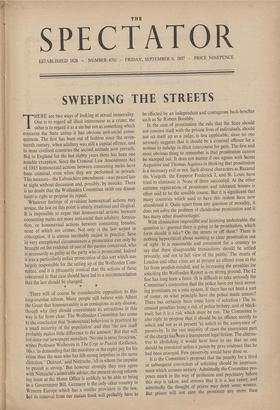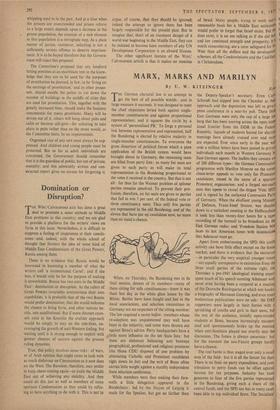SWEEPING THE STREETS
THERE are two ways of looking at sexual immorality. One is to regard all illicit intercourse as a crime; the other is to regard it as a sin but not as something which concerns the State unless it has obvious anti-social conse- quences. The first has been out of fashion since the seven- teenth century, when adultery was still a capital offence, and in most civilised countries the second attitude now prevails. But in England for the last eighty years there has been one notable exception. Since the Criminal Law Amendment Act of 1885 homosexual actions between consenting males have been criminal, even when they are performed in private. This measure—the Labouchere amendment—was passed late at night without discussion and, possibly, by mistake. There is no doubt that the Wolfenden Committee (with one dissen- tient) is right to propose its repeal.
Whatever feelings of revulsion homosexual actions may arouse, the law on this point is utterly irrational and illogical. It is impossible to argue that homosexual actions between consenting males are more anti-social than adultery, fornica- tion, or homosexual actions between consenting females, none of which are crimes. Not only is the law unjust in conception, it is almost inevitably unjust in practice. Save in very exceptional circumstances a prosecution can only be brought on the evidence of one of the parties concerned, who is, necessarily as guilty as the party who is prosecuted. Indeed it was a particularly unfair prosecution of this sort which was largely responsible for the setting up of the Wolfenden Com- mittee, and it is pleasantly ironical that the actions of those concerned in that case should have led to a recommendation that the law should be changed.
* * There will of course be considerable opposition to this long-overdue reform. Many people still believe with Albert the Great that homosexuality is as contagious as any disease, though why they should overestimate its attractions in this way is far from clear. The Wolfenden Committee has come to the conclusion that 'homosexual behaviour is practised by a small minority of the population' and that 'the law itself probably makes little difference to the amount.' But that will not deter our newspaper moralists. 'No one is more ferocious,' writes Professor Weihoven in The Urge to Punish (Gollancz, 16s.), 'in demanding that the murderer or the rapist pay for his crime than the man who has felt strong impulses in the same direction.' Distrust,' said Nietzsche, 'all in whom the impulse to punish is strong.' But however strongly they may agree with Nietzsche's admirable advice, the present strong reform- ing team at the Home Office is unlikely to be able to bring in a Government Bill. Germany is the only other country in Western Europe which has a similar provision in the law, but its removal from our statute book will probably have to be effected by an independent and courageous back-bencher such as Sir Robert Boothby.
In the case of prostitution the rule that the State should not concern itself with the private lives of individuals, should not set itself up as a judge, is less applicable, since no one seriously suggests that it should be a criminal offence for a ' woman to indulge in illicit intercourse for gain. The first and most obvious thing to remember is that prostitution cannot be stamped out. It does not matter if one agrees with Saints Augustine and Thomas Aquinas in thinking that prostitution is a necessary evil or not. Such diverse characters as Recared the Visigoth, the Emperor Frederick I, and St. Louis have tried to eliminate it. None of them succeeded. At the other extreme registration of prostitutes and tolerated houses is often said to be the sensible course. But it is significant that many countries which used to have this system have now abandoned it. Quite apart from any question of morality, it does not solve the problem of clandestine prostitution and it has many other disadvantages.
With elimination impossible' and licensing undesirable, the question is : granted there is going to be prostitution, which form should it take? On the streets or off them? There is nothing hypocritical about wanting to clear prostitution out of sight. It is reasonable and consistent for a country to say that these disagreeable transactions should be settled privately, and not in full view of the public. The streets of London and other cities are at present an affront even to the far from prudish-minded, and in increasing the penalties for soliciting the Wolfenden Report is on strong ground. The £2 fine has long been a farce. (It is difficult to take seriously the Committee's contention that the police have not been arrest- ing prostitutes on a rota system. If there has not been a sort of roster, on what principle have the police made arrests?
There has certainly been some form of selection.) The in- creased penalties bring a risk of police bribery, and of black- mail; but it is a risk which must be run. The Committee is also right to propose that it should be an offence merely to solicit and not as at present 'to solicit to the annoyance of passers-by. In the vast majority of cases the annoyance part of the charge hasiteen a transparent legal fiction. The alterna- tive to abolishing it would have been to say that no one should be convicted unless a passer-by gave evidence that he had been annoyed. Few passers-by would have done so.
It is the Committee's proposal that the penalty for a third or subsequent conviction of soliciting should be imprison- ment which arouses anxiety. Admittedly the Committee pro- poses much in the way of probation and psychiatry before this step is taken, and stresses that it is a last resort; and admittedly the thought of prison may deter some women. But prison will not cure the prostitute any more than
whipping used to in the past. And at a time when the prisons are overcrowded and prison reform to a large extent depends upon a decrease in the prison population, the creation of a new element in that population is a retrograde step. As a plain matter of justice, moreover, soliciting is not a sufficiently serious offence to deserve imprison- ment. It is to be hoped therefore that the Govern- ment will reject this proposal.
The Committee's proposal that any landlord letting premises at an exorbitant rent in the know- ledge that they are to be used for the purposes of prostitution be deemed, in law, to be 'living on the earnings of prostitution,' and its other propo- sals, should enable the police to cut down the number of buildings in the middle of cities that are used for prostitution. This, together with the greatly increased fines, should make the business uneconomic for many prostitutes. Many will be driven out of it; others will hang about pubs and cafés or become call-girls—for soliciting to take place in pubs rather than on the street would, as the Committee hints, be an improvement.
Organised vice of any sort must always be sup- pressed. And children and young people must be protected. But so far as adult individuals are concerned, the Government should remember that it is the guardian of public, but not of private, morality; and this admirably written and con- structed report gives no excuse for forgetting it.

































 Previous page
Previous page